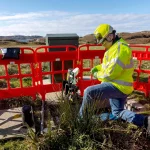UK Mobile Operators Say NO to National Network Roaming
As expected the Government appears to have failed in its first tentative bid to boost mobile voice and Mobile Broadband coverage around the United Kingdom by attempting to encourage greater sharing of masts (network infrastructure) in the hope of fostering a national roaming policy.
The £150 million Mobile Infrastructure Project (MIP) is already working to improve coverage by helping to build new mobile masts in order to serve those who live in areas of poor or non-existent service, which should benefit around 60,000 premises. The MIP covers the cost of installing the necessary infrastructure and this provides the service to areas that have no coverage at all (the network can then be used by all operators).
Advertisement
But the MIP will not solve everything because, as most people already know, the figures for network coverage often do not reflect reality on the ground, where signal reception can frequently break or diminish to the point of being virtually unusable (note: this also happens in urban and sub-urban areas). In addition, it’s often possible to get reception from some but not all operators in the same area.
Back on June 2014 it was revealed that the Government’s Digital Economy Minister, Ed Vaizey, had tentatively proposed solving this problem by nudging the four major mobile operators (EE, Three UK, O2 and Vodafone) into some form of controversial National Roaming Agreement (here). This would have gone beyond the limits of existing network sharing agreements between major operators.
Unsurprisingly the proposal was not popular. Indeed commercial mobile operators that have spent billions to give their network an edge would see little incentive from handing such a huge benefit over to rivals, which may not have made the same level of investment. Furthermore operators might be discouraged from making future investments for fear that rivals would get a free ride. All this comes at a time when Ofcom are also threatening a huge licence fee hike (here).
The Mobile Operators Association (MOA) agreed, “National roaming isn’t the silver bullet that is being suggested. It will take years to implement and will not address the problem of notspots. National roaming would be a disincentive to build more infrastructure. And it is technically difficult and expensive to set up national roaming, and customers would face more dropped calls.” The MOA suggested that it would be better to tackle the issue by reforming the Electronic Communications Code (ECC) and removing barriers, such as costly business rates in rural areas and expensive backhaul / power supplies.
Advertisement
According to an article in Sunday’s FT (paywall), sources have allegedly confirmed that the proposal was “rejected” as unworkable by all operators due to a variety of understandably complex “technical and legal” reasons. Apparently Mr Vaizey has now asked operators to come up with an alternative proposal for tackling the problem. In a statement Mr Vaizey said, “There are [still] areas of the UK that have coverage from some MNOs but not all of them. We’re looking closely at ways to improve mobile coverage in these areas, including national roaming.”
The idea of a national roaming service is fair but, short of effectively nationalising all four operators, it’s difficult to envisage how such an approach could be implemented. Meanwhile the EU are separately working towards scrapping roaming fees and ironically it’s already cheaper in some corners of the UK to make a call by roaming onto a French network than to use a UK provider, assuming you can get reception.
Mark is a professional technology writer, IT consultant and computer engineer from Dorset (England), he also founded ISPreview in 1999 and enjoys analysing the latest telecoms and broadband developments. Find me on X (Twitter), Mastodon, Facebook, BlueSky, Threads.net and Linkedin.
« UPDATE3 Ntlworld Email and YouTube Buffering Woes for Virgin Media

















































Comments are closed